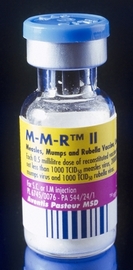Rubella vaccine – MMR vaccination
What is rubella?
Rubella is a disease, caused by a virus. This virus may cause rash, mild fever, or arthritis (rheumatoid or osteoarthritis). Pregnant women, who were ill with rubella are at increased risk of miscarriage. Their children may be born with serious birth defects, including may:
- Intellectual disability;
- Behavioral problems;
- Vision problems;
- Hearing loss;
- Heart defects;
- Increased risk of diabetes throughout life.
Rubella is passed from person to person through droplets in the air (airborne).
The symptoms of rubella include:
- Fatigue;
- Hyperadenosis;
- The rush of blood to the face;
- Red sore throat;
- Fever;
- Headache;
- Arthritis (especially in adults);
- Red, spotty rash all over the body
Rash and fever generally last for 2-3 days.
There are no methods for the treatment of measles. Paracetamol can ease discomfort.
What is rubella vaccine?
Despite, rubella vaccine is available separately, it, usually, administered in combination with other vaccines:
- Measles and mumps – MMR;
- Measles, mumps and chicken pox (vetryanki) – MMRV.

When and who should get vaccinated against rubella?
All children (with some exceptions), You should receive the vaccine two times:
- IN 12-15 months;
- IN 4-6 years (before entering school) – Vaccination can be performed before, but the introduction of doses of vaccine should be carried out with a difference at least four weeks.
The vaccine may also be administered to children 6-11 months, if they travel abroad. These children should also get vaccinated at the age of two 12-15 months 4-6 years.
Persons aged 18 years and younger, who were not vaccinated, administered two doses of MMR vaccine, with a difference of four weeks.
Adults, who were born after 1957 year, and which have not previously been vaccinated, perhaps, required 1-2 doses. Talk to your doctor, If you have not previously been vaccinated.
Risks, associated with the vaccine against rubella
As with any vaccine, MMR vaccine can cause serious problems, such as severe allergic reactions. Although most people do not experience any problems, Some may feel:
- Soft issues:
- Fever;
- Easy rash;
- Swelling of the glands in the cheeks and neck;
- Moderate problems:
- Convulsions, caused by fever;
- Temporary pain and stiffness in the joints;
- Low platelet count;
- Rarely:
- Serious allergic reactions;
- Deafness;
- Long-term seizures;
- Coma;
- Lowering of consciousness;
- Damage to the brain.
Who should not get vaccinated against rubella?
Vaccination is not necessary in the following cases:
- If there were life-threatening allergic reaction to gelatin, antibiotic neomycin, or to a previous dose of MMR vaccine;
- Moderate or severe malaise – wait, as long as you do not recover;
- In the presence of pregnancy vaccination should be carried out after giving birth. If you are trying to get pregnant, must wait four weeks after vaccination.
Talk to your doctor, before introducing MMR vaccine, if you:
- Has the disease, that affects the immune system (eg, HIV / AIDS);
- Taking medications, which affect the immune system (eg, steroids);
- You have cancer or are being treated for cancer;
- Has a low content of blood platelets;
- Had blood transfusion.
What other ways besides vaccination can prevent rubella?
Widespread vaccination has resulted in the virtual elimination of rubella. It is important to avoid contact with people, that, perhaps, susceptible to illness, to prevent infection.
What happens in the event of an outbreak of rubella?
If you suspect rubella must be notified to health authorities. If you suspect, that you or your child is sick with rubella, tell your doctor.
If you were not fully vaccinated, you need to get the vaccine.
